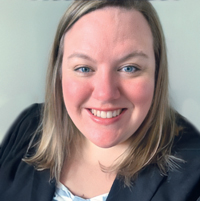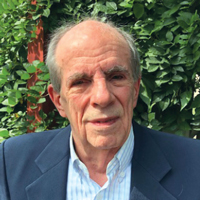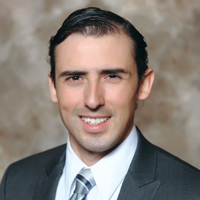Opportunities to expand pro bono practice and legal aid service have exploded since the pandemic. And where one lives and practices has less than ever to do with attorneys’ options in serving low-income clients. In both the metro area and greater Minnesota, the rise of virtual hearings has meant reduced drive time for clients and attorneys alike; less time parking and waiting around a courthouse; and a newfound ability to appear in multiple far-flung counties in one afternoon.
It has also changed the way we interact as humans. So how do you build trust and a strong professional relationship without meeting a client in person? Our contributors have some ideas.
 Shiloh Bute
Shiloh Bute
In her role as managing attorney for Tubman’s Chrysalis Center, Shiloh Bute provides legal representation to low-income survivors of domestic violence, sexual assault, and stalking in order-for-protection matters and in family court. Bute’s work is difficult even when there isn’t a remote component, and she focuses on relationship-building from the start.
“It can be very difficult for a client to just pick up a cold call from you and jump right into what are often complex and emotionally charged issues,” she explains. “I prefer to schedule a time to talk when they are most able to focus and speak freely.”
But how do you get clients to open up with the barrier of a phone or screen? Bute focuses on transparency. “I find that giving clients a brief roadmap of each conversation can [be] helpful,” she notes. “Explaining the process and letting them know why you are asking the questions you are can help ease some of the anxiety and hesitancy. Some clients also just need more time to build rapport. Many take a few conversations before they are ready to open up. Be prepared to put in that time.”
Transparent communication is key to Bute, but in remote attorney-client settings, it can also be her biggest barrier.
“When appearing in person,” she observes, “you could pass a note, whisper to them, or ask the court to allow you a quick chat. I try to plan ahead of time with my clients. Some clients have multiple devices so they can be on the video hearing and send me an email. I [also] prepare them to ask the judicial officer for a moment to speak with me. Most judicial officers will give you time to meet in a breakout room if you ask.”
Bute focuses heavily on the impacts of court outcomes for her clients. Doing so has helped her to build mutual trust in a deeply sensitive area of law. “I recently had a remote Social Early Neutral Evaluation in a family law matter,” she remembers. “The client was very anxious about the process. We had multiple [remote] meetings to prepare [so the] client knew what to expect and we were able to take breaks to connect privately between each step. The results [were] in line with my client’s proposal and we were able to fully settle the issues of custody and parenting time.”
 Stephen Rathke
Stephen Rathke
Following his retirement from a civil litigation practice at Lommen Abdo in 2014, Stephen Rathke was not yet ready to give up the law entirely. Since then he has volunteered with Volunteer Lawyers Network (VLN) and Mid-Minnesota Legal Aid and worked part time at HOME Line, focusing his pro bono practice on criminal expungements and eviction expungements. At any given time, he is typically working five to six criminal expungement matters. This has proven to be a good fit for Rathke, a former county attorney, though a criminal law background is actually not needed for pro bono work in expungements.
 Tools and training provided through ProJustice MN and VLN have helped him to automate parts of the process, particularly when hearings moved online. In particular, Rathke uses tools from ProJustice MN to assist in preparing the motions to request expungements and fee waivers.
Tools and training provided through ProJustice MN and VLN have helped him to automate parts of the process, particularly when hearings moved online. In particular, Rathke uses tools from ProJustice MN to assist in preparing the motions to request expungements and fee waivers.
But automated technology doesn’t build relationships. To start off, Rathke schedules the initial phone call in advance so that clients can be prepared and set aside the time to talk to him. When the time comes to talk in person, he tries to be patient and not interrupt.
Rathke also believes it is important to set boundaries and expectations right away. Expungement work can be complicated and time-consuming for clients—they have to gather many documents, tell their story in detail, and sit through two 60-day waiting periods. When concerns arise, he encourages clients to email rather than call him so that each party can have a record of the conversations and go back to remember pieces if necessary.
Some of the clients Rathke works with are navigating as many as 20 court records in which they are seeking expungement, and these cases are rarely in one county. Prior to the pandemic, Rathke would appear before multiple district courts for each client while working with judges who may be well-versed in expungements or hearing one for the first time.
Rathke hopes the in-person dimension can return, at least in some of his client relationships. “I am not sure that expungement hearings or housing cases will ever be in person [again],” he says. “Zoom hearings are much more convenient for the attorney and the client. But the relationship suffers without an opportunity to meet face to face.”
Rathke has learned how to build relationships with his remote clients, but he does hope to meet with them in person again someday, even if their hearings stay remote. “Clients may be put off by representation by an old white guy,” he notes. “A friendly initial face-to-face meeting can make the client more comfortable, and I look forward to having that kind of meeting as the covid threat decreases.”
 Eduardo Aburto Ortiz
Eduardo Aburto Ortiz
For the past three years, Eduardo Aburto Ortiz has been participating in pro bono and low bono programs through Central Minnesota Legal Services and Legal Aid Service of Northeastern Minnesota, and he describes the work as a “very fulfilling, and sometimes challenging, experience.”
Building trust in a remote relationship comes with its own set of obstacles that face-to-face contact may overcome more quickly. The key to Ortiz’s success? It’s simple. Listening. “I always try to take time to listen to my client’s story,” he says. “I try to understand what they want to accomplish and advise them on how to get there [by] managing their expectations.”
Creating an open dialogue with clients is critical in building trust in a remote representation—but navigating differences in technological capabilities can prove a bigger obstacle. Many low-income individuals had to adapt rapidly to communicating in an online space during the pandemic, and the legal field experienced its share of difficulties. For example, says Ortiz, “I had challenges with clients providing documentation in picture format. Especially when it is a document that needs to be filed with the court. That presents challenges for low-income individuals who may not have access to scanners or don’t know where to go to use one.”
Small details like this can have critical impact on the flow of information and the speediness of representation, but Ortiz doesn’t mind. “I’m pretty savvy with technology,” he notes, “so if someone is having issues, I try to help resolve them. I provide them with alternatives [and] direct them to places where they can get help.”
Providing resources is a service that Ortiz uses in relationship-building in the remote sphere, but his work has had critical impacts beyond technology skill development. For Ortiz, it’s all about advocacy.
“I did have a client who felt disenfranchised by the legal system,” he recalls. “That client also thought I was part of that system that had failed to meet the client’s needs when I hadn’t even started the representation. I was firm in making the client understand that I was an advocate and an adviser, and we needed to work together on this if we wanted to succeed.
“Being honest and transparent from the beginning has always worked out for me. This cannot be accomplished without taking the time to listen and understand the client’s needs.”
A note from OLPR: Ethical considerations in remote representation
- Screenshare carefully when working with clients remotely to avoid inadvertent exposure of confidential information from your other clients. Your client needs to know their information is safe, too.
- If your client is in an environment with other people when you connect remotely, ask who they are, greet them, acknowledge the relationships, express appreciation for their support—and then explain why it’s necessary for you to talk with the client alone for a few minutes.
- Technology might make communication with remote clients easier, but it is okay to set and enforce limits around your response time. Be upfront about what you can do. If you accept texts, tell your client that you will try to respond within a day but response times may vary. It can be tempting to let the immediacy of the medium control timing expectations, but “promptly” complying with a client’s reasonable requests for information does not mean immediately or even the same day.
— Karin Ciano & Susan Humiston
Sarah Etheridge is the MSBA’s access to justice administrative coordinator.